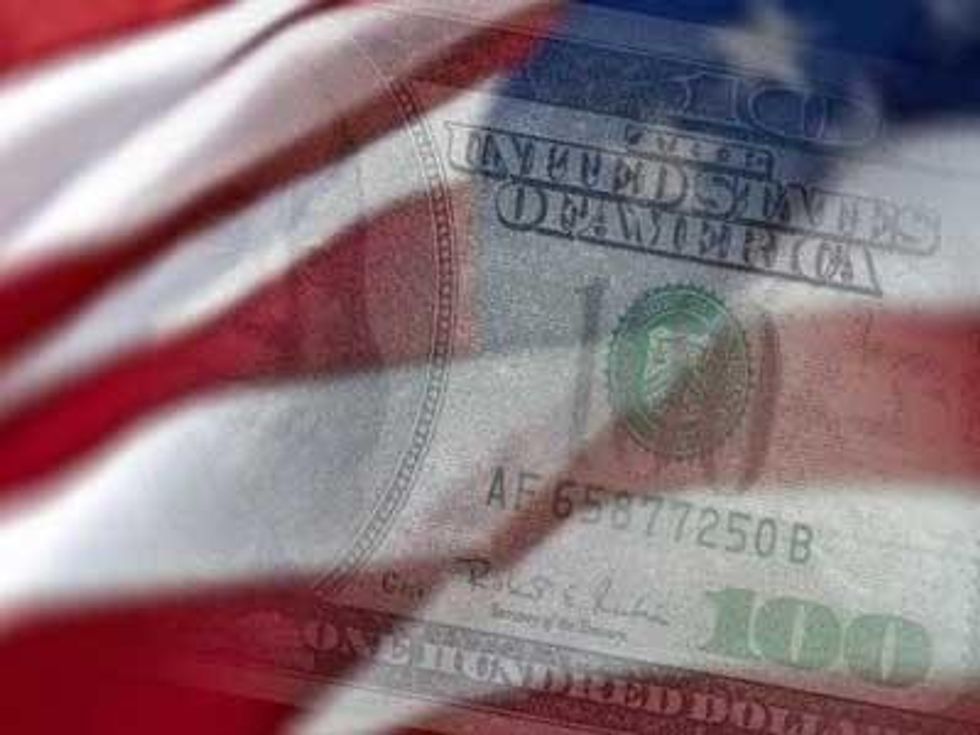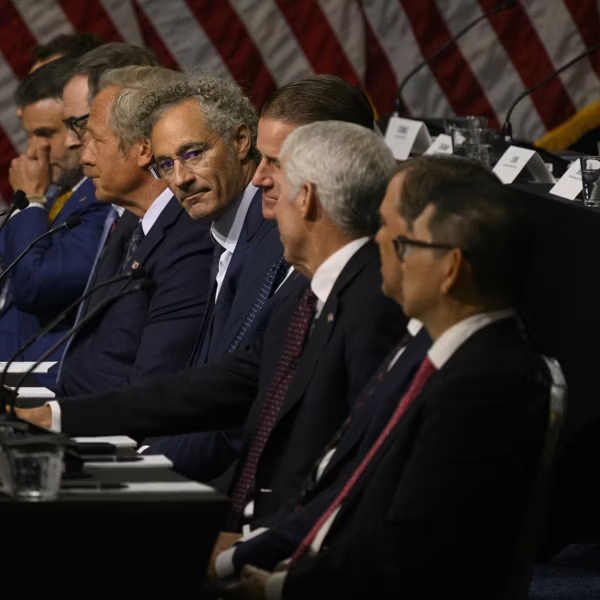The Buying of the President 2012: Meet the Super-PAC Mega-Donors
The more we learn about Super PACs, the uglier the picture gets.

A new analysis by USA Today found that just five super-wealthy individuals have contributed 25 percent of the money raised by Super PACs since the beginning of 2011. The New York Times added that "two dozen individuals, couples or corporations have given $1 million or more to Republican super PACs this year.... Collectively, their contributions have totaled more than $50 million this cycle, making them easily the most influential and powerful political donors in politics today."
The hierarchy is topped by Texas businessman Harold Simmons, a major funder of the Swift Boat Veterans for Truth in 2004, who has donated nearly $15 million to three different GOP candidates (Perry, Gingrich and Romney) and the Karl Rove-founded American Crossroads. He's followed by Las Vegas casino magnate Sheldon Adelson, who's given $10 million to Gingrich's Super PAC and says he may give an additional "$10 or $100 million to Gingrich" before the primary season is over. "Take away Sheldon Adelson and the pro-Gingrich 'Winning Our Future' PAC is just a federally registered lemonade stand," Stephen Colbert joked.
While Gingrich is wholly dependent on Adelson, Rick Santorum's Super PAC raised the bulk of its money in January from just two individuals, Wyoming billionaire Foster Freiss and Louisiana energy executive William Dore. Even insurgent candidates must be propped up by billionaires nowadays to stay competitive. In contrast, the Super PAC of erstwhile front-runner Mitt Romney raised $5 million last month from twenty-five donors. That's a diversified portfolio compared to Santorum and Gingrich. Virtually all of the money contributed to these Super PACs came from $25,000 checks or higher. The Super-PAC era gives a whole new meaning to the phrase "the buying of the president."
A recent report from Demos and US PIRG found that 196 people have contributed nearly 80 percent of the individual donations to Super PACs in 2010 and 2011 by giving $100,000 or more each, for a total of $79 million. That's 43 percent of the $181 million total raised by Super PACs during this period (the rest comes from businesses, unions and other PACs). Demos and US PIRG provided me with the names of these donors and which Super PACs they gave money to. Click here to see the document (pdf). They are the .000063 percent of the electorate who will shape the 2012 campaign on both sides of the aisle.
"I'm against very wealthy people attempting to or influencing elections," Adelson told Forbes this week. "But as long as it's doable, I'm going to do it." That's the best argument yet for overturning the Supreme Court's Citizens United decision.
An Urgent Message From Our Co-Founder
Dear Common Dreams reader, The U.S. is on a fast track to authoritarianism like nothing I've ever seen. Meanwhile, corporate news outlets are utterly capitulating to Trump, twisting their coverage to avoid drawing his ire while lining up to stuff cash in his pockets. That's why I believe that Common Dreams is doing the best and most consequential reporting that we've ever done. Our small but mighty team is a progressive reporting powerhouse, covering the news every day that the corporate media never will. Our mission has always been simple: To inform. To inspire. And to ignite change for the common good. Now here's the key piece that I want all our readers to understand: None of this would be possible without your financial support. That's not just some fundraising cliche. It's the absolute and literal truth. We don't accept corporate advertising and never will. We don't have a paywall because we don't think people should be blocked from critical news based on their ability to pay. Everything we do is funded by the donations of readers like you. Will you donate now to help power the nonprofit, independent reporting of Common Dreams? Thank you for being a vital member of our community. Together, we can keep independent journalism alive when it’s needed most. - Craig Brown, Co-founder |
The more we learn about Super PACs, the uglier the picture gets.

A new analysis by USA Today found that just five super-wealthy individuals have contributed 25 percent of the money raised by Super PACs since the beginning of 2011. The New York Times added that "two dozen individuals, couples or corporations have given $1 million or more to Republican super PACs this year.... Collectively, their contributions have totaled more than $50 million this cycle, making them easily the most influential and powerful political donors in politics today."
The hierarchy is topped by Texas businessman Harold Simmons, a major funder of the Swift Boat Veterans for Truth in 2004, who has donated nearly $15 million to three different GOP candidates (Perry, Gingrich and Romney) and the Karl Rove-founded American Crossroads. He's followed by Las Vegas casino magnate Sheldon Adelson, who's given $10 million to Gingrich's Super PAC and says he may give an additional "$10 or $100 million to Gingrich" before the primary season is over. "Take away Sheldon Adelson and the pro-Gingrich 'Winning Our Future' PAC is just a federally registered lemonade stand," Stephen Colbert joked.
While Gingrich is wholly dependent on Adelson, Rick Santorum's Super PAC raised the bulk of its money in January from just two individuals, Wyoming billionaire Foster Freiss and Louisiana energy executive William Dore. Even insurgent candidates must be propped up by billionaires nowadays to stay competitive. In contrast, the Super PAC of erstwhile front-runner Mitt Romney raised $5 million last month from twenty-five donors. That's a diversified portfolio compared to Santorum and Gingrich. Virtually all of the money contributed to these Super PACs came from $25,000 checks or higher. The Super-PAC era gives a whole new meaning to the phrase "the buying of the president."
A recent report from Demos and US PIRG found that 196 people have contributed nearly 80 percent of the individual donations to Super PACs in 2010 and 2011 by giving $100,000 or more each, for a total of $79 million. That's 43 percent of the $181 million total raised by Super PACs during this period (the rest comes from businesses, unions and other PACs). Demos and US PIRG provided me with the names of these donors and which Super PACs they gave money to. Click here to see the document (pdf). They are the .000063 percent of the electorate who will shape the 2012 campaign on both sides of the aisle.
"I'm against very wealthy people attempting to or influencing elections," Adelson told Forbes this week. "But as long as it's doable, I'm going to do it." That's the best argument yet for overturning the Supreme Court's Citizens United decision.
The more we learn about Super PACs, the uglier the picture gets.

A new analysis by USA Today found that just five super-wealthy individuals have contributed 25 percent of the money raised by Super PACs since the beginning of 2011. The New York Times added that "two dozen individuals, couples or corporations have given $1 million or more to Republican super PACs this year.... Collectively, their contributions have totaled more than $50 million this cycle, making them easily the most influential and powerful political donors in politics today."
The hierarchy is topped by Texas businessman Harold Simmons, a major funder of the Swift Boat Veterans for Truth in 2004, who has donated nearly $15 million to three different GOP candidates (Perry, Gingrich and Romney) and the Karl Rove-founded American Crossroads. He's followed by Las Vegas casino magnate Sheldon Adelson, who's given $10 million to Gingrich's Super PAC and says he may give an additional "$10 or $100 million to Gingrich" before the primary season is over. "Take away Sheldon Adelson and the pro-Gingrich 'Winning Our Future' PAC is just a federally registered lemonade stand," Stephen Colbert joked.
While Gingrich is wholly dependent on Adelson, Rick Santorum's Super PAC raised the bulk of its money in January from just two individuals, Wyoming billionaire Foster Freiss and Louisiana energy executive William Dore. Even insurgent candidates must be propped up by billionaires nowadays to stay competitive. In contrast, the Super PAC of erstwhile front-runner Mitt Romney raised $5 million last month from twenty-five donors. That's a diversified portfolio compared to Santorum and Gingrich. Virtually all of the money contributed to these Super PACs came from $25,000 checks or higher. The Super-PAC era gives a whole new meaning to the phrase "the buying of the president."
A recent report from Demos and US PIRG found that 196 people have contributed nearly 80 percent of the individual donations to Super PACs in 2010 and 2011 by giving $100,000 or more each, for a total of $79 million. That's 43 percent of the $181 million total raised by Super PACs during this period (the rest comes from businesses, unions and other PACs). Demos and US PIRG provided me with the names of these donors and which Super PACs they gave money to. Click here to see the document (pdf). They are the .000063 percent of the electorate who will shape the 2012 campaign on both sides of the aisle.
"I'm against very wealthy people attempting to or influencing elections," Adelson told Forbes this week. "But as long as it's doable, I'm going to do it." That's the best argument yet for overturning the Supreme Court's Citizens United decision.

